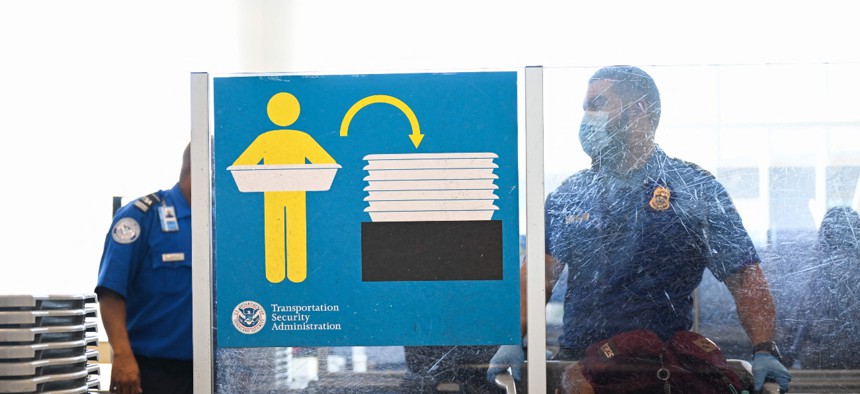
A provision that would apply Title 5 of the U.S. Code to Transportation Security Administration employees, providing them full civil service protections and access to the General Schedule pay scale, was not included. PATRICK T. FALLON/AFP via Getty Images
Here’s the Workforce Provisions that Did and Didn’t Make It Into the Final Defense Policy Bill
Did TSA employees get access to the General Schedule pay scale? No.
After months of negotiations, Congress is finally set to approve its annual defense policy bill, with several federal workforce provisions tagging along as it reaches the finish line.
The House on Thursday voted 350-80 to pass the fiscal 2023 National Defense Authorization Act. It now heads to the Senate for approval, after which point it will go to President Biden’s desk for enactment.
As an annual must-pass piece of legislation, the NDAA often serves as a “Christmas tree” where lawmakers attach other pieces of legislation related to federal agencies to ensure their passage. In recent years, the bill has shepherded policies like paid parental leave for federal workers into law.
This year’s bill saw a number of noteworthy provisions added to the bill, along with several proposals left on the cutting room floor. Among the most prominent omissions was a bill that would block Republican-led efforts to strip federal workers of their civil service protections, such as then-President Trump’s abortive Schedule F job classification.
Language from the Senate version of the bill delaying the end of the Defense Department’s two-year probationary period where new employees can be fired prior to full civil service protections kicking in, proposed because the Pentagon had not submitted a report on the practice’s effectiveness, was left off the final version. The department will revert to the traditional one-year probationary period beginning in January.
Included in the final bill is the Federal Firefighters Fairness Act, a House-passed bill that establishes a presumption that federal firefighters with at least five years of service who develop any one of a number of serious health conditions, including lung diseases and lung, brain and digestive system cancers, did so due to on-the-job exposure to smoke and other hazardous materials for the purposes of securing workers compensation benefits through the Federal Employees’ Compensation Act.
Also in the legislation is language requiring the Veterans Affairs Department to conduct annual surveys of basic and locality pay for health care positions at the department’s medical centers to make salaries more competitive with the private sector.
But missing from the legislation was a provision that would apply Title 5 of the U.S. Code to Transportation Security Administration employees, providing them full civil service protections and access to the General Schedule pay scale.
For years, the agency, formed in the aftermath of the Sept. 11, 2001 terrorist attacks, has suffered from low morale and retention, and employees there have been paid significantly lower than their counterparts elsewhere in government. They also have abridged collective bargaining rights.
The Biden administration has begun the process of administratively applying the tenets of Title 5 to the workforce, but advocates have urged Congress to codify that change in law so that it cannot be reversed by a future administration.
In a statement, House Homeland Security Committee Chairman Bennie Thompson, D-Miss., who introduced the TSA legislation, bemoaned the bill’s exclusion from the final product.
“I would be remiss if I did not acknowledge my disappointment that we were not able to reach agreement with the Senate on amending the law to treat TSA’s workforce like most other federal employees,” he said.







